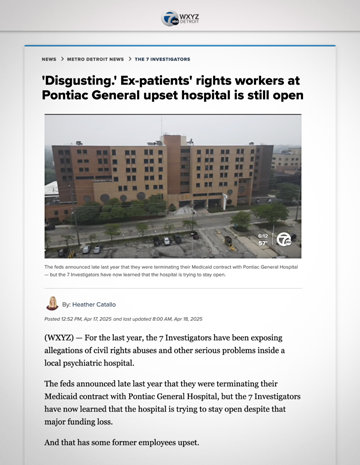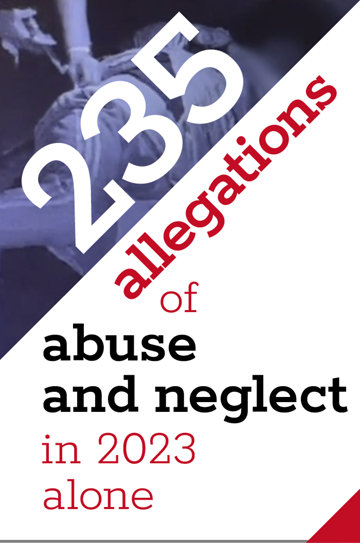Pontiac General Hospital, a privately owned behavioral holding facility just north of Detroit, is at the center of a storm of civil rights violations, systemic neglect and regulatory failure. Although its federal Medicare and Medicaid agreement was terminated in November 2024 after years of documented abuse, the hospital still clings to life, housing a mere four patients while seeking the gold star of legitimacy—accreditation from The Joint Commission, a nonprofit entity responsible for evaluating healthcare organizations’ compliance with safety, quality and regulatory standards.
“It was sad and disgusting.”
That the hospital remains open at all is enough to stir disgust among former employees, ex-patients and advocates who say its very existence is a stain on Michigan’s mental health system.
In 2023 alone, Pontiac General faced 235 allegations of abuse and neglect.
But numbers only hint at the human cost.
Valerie Linteau, who served as Pontiac’s recipient rights officer for eight months, described scenes of horror and helplessness—psychiatric patients shoved into isolation rooms and tied down with restraints while staff forcibly injected them with drugs and, in one case, a patient left with a skull fracture after allegedly being punched by an employee. “It was sad and disgusting,” Linteau said, adding that she cried upon viewing a video of the incident.

Her attempt to raise alarms reportedly cost her the job. Accused of using a personal phone and deleting files, Linteau maintains that she was fired for alerting state authorities to what she witnessed inside hospital walls.
She is not alone. Darius Hardrick, Linteau’s predecessor, echoed her claims. “Actual physical abuse,” he told WXYZ Channel 7. “I’ve seen patients getting beat on.” Overwhelmed by patient complaints and sidelined by hospital leadership, Hardrick eventually left. “They would just railroad me and try to take over the investigation,” he explained.
A third party, Disability Rights Michigan, backed up Linteau’s and Hardrick’s accounts. Simon Zagata, director of its Community and Institutional Rights Team, said: “It’s pretty clear that patients are not getting appropriate treatment and patients are getting abused. No money, but especially federal money, should be going to pay for treatment that results in that.”
Beyond physical abuse, stories of psychological trauma and coercion paint an equally disturbing picture. One former patient, hospitalized involuntarily for nine days, described the ordeal as one she relives daily. Another, a 23-year-old woman, sobbed during her first phone call home after being allegedly assaulted by a staff member. Her mother filed a police report.
Another patient’s death became a turning point. A 41-year-old man was restrained in April 2024 by staff, with one employee using his knee, elbow and chest until the man stopped breathing. CPR was delayed, and a defibrillator wasn’t used for at least 13 minutes. The man was pronounced dead after being transferred to another hospital.
In the eyes of federal investigators from the Centers for Medicare and Medicaid Services (CMS), the pattern was unmistakable: a dangerous facility with substandard care, a disregard for safety protocols and leadership seemingly indifferent to the damage.
The punishment, when it came, was financial. On November 24, 2024, CMS terminated Pontiac General’s participation in Medicare and Medicaid—a day after the hospital filed for Chapter 11 bankruptcy, citing debts of up to $10 million to 99 creditors. More than 240 employees were laid off.
But the story doesn’t end there. Records revealed that hospital administrators viewed the CMS termination as “temporary” and sought accreditation from The Joint Commission in hopes of regaining funding.

That effort has alarmed watchdogs. “Showing that you can adequately care for four patients is a completely different ball game than showing that you can take care of 100+ patients,” Zagata said, adding: “We have just not seen a history of an ability to treat patients well.”
To date, The Joint Commission has declined to confirm whether Pontiac General is seeking accreditation, citing confidentiality. The hospital itself has not responded to repeated media requests for comment.
Pontiac General is hardly an outlier. In recent years, psychiatric warehouses across the country—from the Psychiatric Institute of Washington, DC to Palmetto Summerville Behavioral Health in South Carolina—have faced similar allegations. Buzzwords like “filthy,” “violence” and “no report was ever filed” have become grimly familiar.
What the hospitals share is a business model where patients are stockpiled, their trauma monetized and accountability forestalled by the opaqueness of the psychiatric industry. Federal and state regulators often act too late and, when they do, it’s with little assurance that real change will follow.
Pontiac’s bankruptcy filing is both a consequence and a symptom of a system in decay—one that, in the words of Freedom’s December 3, 2024, article about the hospital’s bankruptcy, has turned the promise of help into a “reign of institutional terror.”
As of spring 2025, Pontiac General Hospital is still open. For advocates and survivors alike, the question remains: How many more warnings, lawsuits and deaths must it take before the system recognizes that “treatment” must begin with accountability?
Until then, Pontiac is less a hospital and more a mirror—reflecting what happens when vulnerable people are entrusted to an industry that abuses them, not to mention a bureaucracy that too often chooses silence over scrutiny.






















